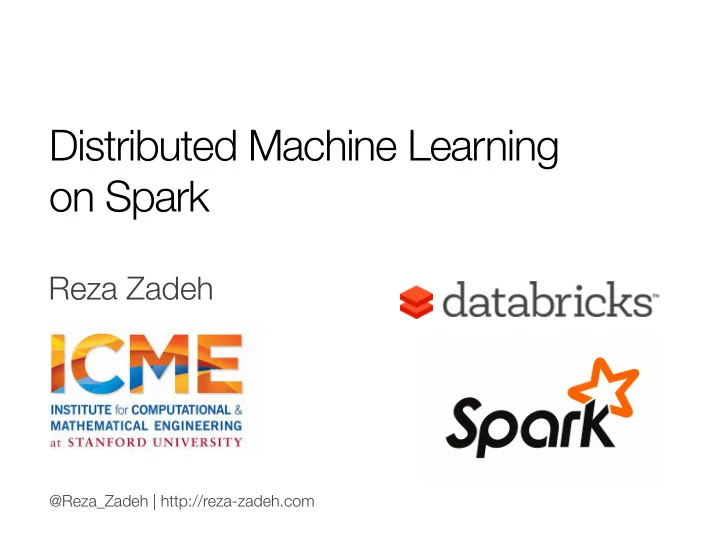

Distributed Machine Learning � on Spark Reza Zadeh @Reza_Zadeh | http://reza-zadeh.com
Outline Data flow vs. traditional network programming Spark computing engine Optimization Example Matrix Computations MLlib + {Streaming, GraphX, SQL} Future of MLlib
Data Flow Models Restrict the programming interface so that the system can do more automatically Express jobs as graphs of high-level operators » System picks how to split each operator into tasks and where to run each task » Run parts twice fault recovery Map Reduce Biggest example: MapReduce Map Reduce Map
Spark Computing Engine Extends a programming language with a distributed collection data-structure » “Resilient distributed datasets” (RDD) Open source at Apache » Most active community in big data, with 50+ companies contributing Clean APIs in Java, Scala, Python Community: SparkR
Key Idea Resilient Distributed Datasets (RDDs) » Collections of objects across a cluster with user controlled partitioning & storage (memory, disk, ...) » Built via parallel transformations (map, filter, …) » The world only lets you make make RDDs such that they can be: Automatically rebuilt on failure
MLlib History MLlib is a Spark subproject providing machine learning primitives Initial contribution from AMPLab, UC Berkeley Shipped with Spark since Sept 2013
MLlib: Available algorithms classification: classification: logistic regression, linear SVM, � naïve Bayes, least squares, classification tree regr egression: ession: generalized linear models (GLMs), regression tree collaborative filtering: collaborative filtering: alternating least squares (ALS), non-negative matrix factorization (NMF) clustering: clustering: k-means|| decomposition: decomposition: SVD, PCA optimization: optimization: stochastic gradient descent, L-BFGS
Optimization At least two large classes of optimization problems humans can solve: » Convex Programs » Spectral Problems
Optimization Example
Logistic Regression data ¡= ¡spark.textFile(...).map(readPoint).cache() ¡ ¡ w ¡= ¡numpy.random.rand(D) ¡ ¡ for ¡i ¡ in ¡range(iterations): ¡ ¡ ¡ ¡ ¡gradient ¡= ¡data.map(lambda ¡p: ¡ ¡ ¡ ¡ ¡ ¡ ¡ ¡ ¡(1 ¡/ ¡(1 ¡+ ¡exp(-‑p.y ¡* ¡w.dot(p.x)))) ¡* ¡p.y ¡* ¡p.x ¡ ¡ ¡ ¡ ¡).reduce(lambda ¡a, ¡b: ¡a ¡+ ¡b) ¡ ¡ ¡ ¡ ¡w ¡-‑= ¡gradient ¡ ¡ print ¡“Final ¡w: ¡%s” ¡% ¡w ¡
Logistic Regression Results 4000 3500 110 s / iteration ime (s) Running Time (s) 3000 2500 Running T Hadoop 2000 1500 Spark 1000 500 first iteration 80 s 0 further iterations 1 s 1 5 10 20 30 Number of Iterations Number of Iterations 100 GB of data on 50 m1.xlarge EC2 machines ¡
Behavior with Less RAM 100 68.8 58.1 80 Iteration time (s) Iteration time (s) 40.7 60 29.7 40 11.5 20 0 0% 25% 50% 75% 100% % of working set in memory % of working set in memory
Distributing Matrix Computations
Distributing Matrices How to distribute a matrix across machines? » By Entries (CoordinateMatrix) » By Rows (RowMatrix) » By Blocks (BlockMatrix) As ¡of ¡version ¡1.3 ¡ All of Linear Algebra to be rebuilt using these partitioning schemes
Distributing Matrices Even the simplest operations require thinking about communication e.g. multiplication How many different matrix multiplies needed? » At least one per pair of {Coordinate, Row, Block, LocalDense, LocalSparse} = 10 » More because multiplies not commutative
Singular Value Decomposition on Spark
Singular Value Decomposition
Singular Value Decomposition Two cases » Tall and Skinny » Short and Fat (not really) » Roughly Square SVD method on RowMatrix takes care of which one to call.
Tall and Skinny SVD
Tall and Skinny SVD Gets ¡us ¡ ¡ ¡V ¡and ¡the ¡ singular ¡values ¡ Gets ¡us ¡ ¡ ¡U ¡by ¡one ¡ matrix ¡multiplication ¡
Square SVD ARPACK: Very mature Fortran77 package for computing eigenvalue decompositions � JNI interface available via netlib-java � Distributed using Spark – how?
Square SVD via ARPACK Only interfaces with distributed matrix via matrix-vector multiplies The result of matrix-vector multiply is small. The multiplication can be distributed.
Square SVD With 68 executors and 8GB memory in each, looking for the top 5 singular vectors
Communication-Efficient All pairs similarity on Spark (DIMSUM)
� All pairs Similarity All pairs of cosine scores between n vectors » Don’t want to brute force (n choose 2) m » Essentially computes Compute via DIMSUM » Dimension Independent Similarity Computation using MapReduce
Intuition Sample columns that have many non-zeros with lower probability. � On the flip side, columns that have fewer non- zeros are sampled with higher probability. � Results provably correct and independent of larger dimension, m.
Spark implementation
MLlib + {Streaming, GraphX, SQL}
A General Platform Standard libraries included with Spark Spark MLlib Spark SQL GraphX Streaming � machine structured graph learning real-time … Spark Core
Benefit for Users Same engine Same engine performs data extraction, model training and interactive queries Separate engines parse query train DFS DFS DFS DFS DFS DFS … read write read write read write Spark parse query train DFS read DFS
MLlib + Streaming As of Spark 1.1, you can train linear models in a streaming fashion, k-means as of 1.2 Model weights are updated via SGD, thus amenable to streaming More work needed for decision trees
� MLlib + SQL points = context.sql(“select latitude, longitude from tweets”) � model = KMeans.train(points, 10) � DataFrames coming in Spark 1.3! (March 2015)
MLlib + GraphX
Future of MLlib
Research Goal: General Distributed Optimization Distribute ¡CVX ¡by ¡ backing ¡CVXPY ¡with ¡ PySpark ¡ ¡ Easy-‑to-‑express ¡ distributable ¡convex ¡ programs ¡ ¡ Need ¡to ¡know ¡less ¡ math ¡to ¡optimize ¡ complicated ¡ objectives ¡
Spark Community Most active open source community in big data 200+ 200+ developers, 50+ 50+ companies contributing Contributors in past year 150 100 50 Giraph Storm 0
Continuing Growth Contributors per month to Spark source: ohloh.net
Spark and ML Spark has all its roots in research, so we hope to keep incorporating new ideas!
Recommend
More recommend